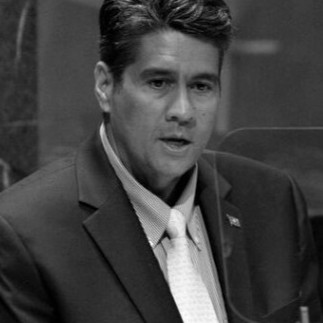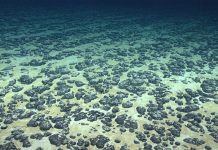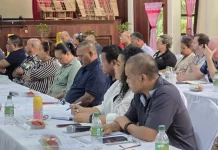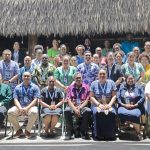Palau’s presidential election is shaping up to be one of the most distinctive in Palau’s recent history.
On 05 November, two prominent political figures—who also happen to be brothers-in-law— will face off for the second time. However, political observers anticipate that the election outcome may remain uncertain for a week, as absentee ballots will decide the closely contested race.
The candidates—one a charismatic leader, the other a popular and wealthy businessman—are making strong appeals to voters at home and abroad.
Incumbent President Surangel Whipps Jr is vying for a second term against former four-term president Tommy E Remengesau Jr. Both candidates have adopted similar campaign strategies, focusing on personal interactions rather than large public rallies or extensive media coverage.
Interestingly, the most vibrant campaign events are happening outside Palau, in places like Guam, the Northern Marianas Islands, and among large Palauan communities in the U.S, particularly on the West Coast and in Texas. These gatherings are marked by festive elements, including live bands, local superstar singers and the Palauan version of the ballroom cha-cha dance.
In their first face-off in 2016, Remengesau narrowly defeated Whipps by just 264 votes (51.2 percent), with strong support from overseas voters expanding a narrow margin from home. A similar dynamic is expected in this election, although the atmosphere is notably more subdued this time. Whipps, benefiting from the advantage of incumbency, has taken a more proactive role in showcasing his administration’s accomplishments, while Remengesau is on the defensive.
As he has done throughout his term, Whipps brings government officials and technical experts to the villages during his state visits, providing updates on government progress and addressing citizens’ concerns. However, critics allege that these state visits are merely a guise for using government resources for campaign activities. Whipps has also engaged in personalised, house-to-house visits with voters, a common campaign tactic in Palau.
Remengesau is also taking his campaign directly to the communities. In a visit to Ngeremlengui State, he campaigned alongside Senate president Hokkons Baules, major WCTC shareholder George Rechucher, former senator and Ngaraard traditional chief Joel Toribiong, and delegates Swenny Ongidobel and Timothy Sinsak.
The rising cost of living is a key issue on the campaign trail, with discussions frequently turning to the recent tax reform, specifically the value added tax, known locally as the Palau goods and services tax, or PGST.
Whipps has defended PGST, pointing to the revenue it has generated for government programmes, including tax refunds, US$120 pay increases for government employees, childrearing subsidies, and additional support for retirees and low-income earners.
Over the past two years, more than US$20 million in new funding has been injected into the economy, including the upcoming US$11 million in disbursements through the U.S. federal Work Innovation and Opportunity Act program.
Additionally, Whipps has emphasised the success of securing US$890 million in compact funding over the next 20 years, noting that this amount is double what was initially available when he took office. Recently, he has taken a victory lap announcing a new benefit for Palauan students, who, as of 01 July, are eligible for in-state tuition at any public college or university in the United States, a privilege newly extended to citizens of the freely associated states.
When asked about the price increases, Whipps blames Vladimir Putin, asserting that Russia’s aggression against Ukraine has fueled global inflationary pressures, from which Palau has not been immune.
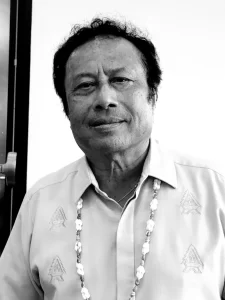
Remengesau, on the other hand, argues that PGST has shifted the burden from big businesses to the ordinary consumer, claiming that PGST is the main culprit behind the higher cost of goods, making the cost of living unaffordable for many Palauans. He argues that food and medicines hit the people the hardest and should be tax-free. He also maintains that big businesses pay paltry taxes and can apply any of the nearly 100 tax deductibles to get away with paying less or nothing on their profits.
During his visit to Ngeremlengui State, Remengesau attributed Palauans’ outmigration to the rising cost of living and the government’s low priority on addressing the urgent need for affordable housing. In addition, he said that PGST has imposed a heavy burden by imposing taxes on public services provided by such state-owned enterprises as PPUC and PNCC.
To address the continued concern with crystal methamphetamine and fear of the introduction of fentanyl into Palau, Remengesau said he would restore the independent drug enforcement unit with a separate team of investigators. This seemingly simple message brings up the issue of the Bureau of Public Safety operating without the full-time presence of its top official, Director Cary LeVitre, who has spent most of his time at home in the United States since being hired in April 2023.
Remengesau’s enduring popularity poses a significant threat to Whipps’ chances of securing a second term. In response, Whipps’ political allies have formally requested the Palau Election Commission to disqualify Remengesau’s candidacy, arguing that the Palau constitution prohibits Remengesau from seeking another term beyond the two consecutive terms he has already served. Opponents of Remengesau hope to escalate the issue to the Supreme Court.
However, election analysts see as real the threat to Whipps’ chances based on the results of recent state elections that suggest gubernatorial candidates politically aligned with Remengesau have been successful, giving them only anecdotal evidence that Remengesau remains a formidable candidate for this closely contested presidential election.





